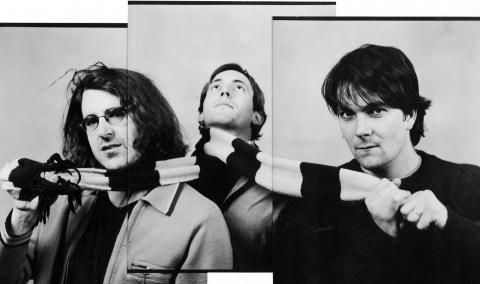American indie rock band Sebadoh, which plays in Taiwan for the first time this Sunday at The Wall (這牆), dates back to the days when aspiring musicians recorded demos on a four-track cassette recorder instead of a computer hard drive.
Sebadoh’s “lo-fi” sound earned the group a loyal following, thanks to its cassette albums of folk and post-punk laced with off-the-cuff noise and sampled sounds. The “band” began as a one-man project in western Massachusetts in the late 1980s by vocalist and guitarist Lou Barlow, also a founding member and bassist of alt-rock legend Dinosaur Jr.
At first, Sebadoh was Barlow’s personal creative outlet — at the time, he felt overshadowed by the songwriting prowess of his Dinosaur Jr bandmate J Mascis. Then it became an outlet of frustration after he feuded with Mascis and got kicked out of Dinosaur Jr. That experience partly inspired The Freed Man (1989), a beloved album among devout Sebadoh fans.

Photo courtesy of Earwax Productions
Beneath the tape hiss, there was a clear sense of songcraft in Sebadoh’s music that helped the band get signed with Sub Pop, the Seattle indie rock label best known for nurturing grunge groups Nirvana and Soundgarden and currently popular bands like the indie folk ensemble Fleet Foxes.
While scores of indie musicians and fans today have embraced lo-fi as an aesthetic and even a genre, Barlow says it’s just a “technical term referring to the way a song was recorded.”
“I think we are mid-fi,” he wrote in a brief e-mail interview with the Taipei Times.
“We recorded our songs well but not to industry standards.”
Through Sub Pop, Sebadoh reached its closest to mainstream success with Bakesale (1994) and Harmacy (1996), which saw Barlow’s melodic, confessional songwriting come to the fore. The band’s sound became more focused, favoring anthemic indie rock songs full of cynical musings on love and heartbreak.
Barlow has been keeping busy in recent years. He is now back touring and recording with Dinosaur Jr. And Sebadoh is picking up steam again: Sub Pop re-released Bakesale earlier this summer, and the band has just finished a tour of Europe and Australia, with a run of shows scheduled in Japan after its Taipei concert.
Concertgoers will hear songs from Bakesale and Harmacy on Sunday when Barlow takes to the stage with his bandmates, bassist Jason Loewenstein and drummer Bob D’Amico. Barlow says the band’s current repertoire of 30 songs also includes a few from outside of those albums.

In the March 9 edition of the Taipei Times a piece by Ninon Godefroy ran with the headine “The quiet, gentle rhythm of Taiwan.” It started with the line “Taiwan is a small, humble place. There is no Eiffel Tower, no pyramids — no singular attraction that draws the world’s attention.” I laughed out loud at that. This was out of no disrespect for the author or the piece, which made some interesting analogies and good points about how both Din Tai Fung’s and Taiwan Semiconductor Manufacturing Co’s (TSMC, 台積電) meticulous attention to detail and quality are not quite up to

April 21 to April 27 Hsieh Er’s (謝娥) political fortunes were rising fast after she got out of jail and joined the Chinese Nationalist Party (KMT) in December 1945. Not only did she hold key positions in various committees, she was elected the only woman on the Taipei City Council and headed to Nanjing in 1946 as the sole Taiwanese female representative to the National Constituent Assembly. With the support of first lady Soong May-ling (宋美齡), she started the Taipei Women’s Association and Taiwan Provincial Women’s Association, where she

Chinese Nationalist Party (KMT) Chairman Eric Chu (朱立倫) hatched a bold plan to charge forward and seize the initiative when he held a protest in front of the Taipei City Prosecutors’ Office. Though risky, because illegal, its success would help tackle at least six problems facing both himself and the KMT. What he did not see coming was Taipei Mayor Chiang Wan-an (將萬安) tripping him up out of the gate. In spite of Chu being the most consequential and successful KMT chairman since the early 2010s — arguably saving the party from financial ruin and restoring its electoral viability —

It is one of the more remarkable facts of Taiwan history that it was never occupied or claimed by any of the numerous kingdoms of southern China — Han or otherwise — that lay just across the water from it. None of their brilliant ministers ever discovered that Taiwan was a “core interest” of the state whose annexation was “inevitable.” As Paul Kua notes in an excellent monograph laying out how the Portuguese gave Taiwan the name “Formosa,” the first Europeans to express an interest in occupying Taiwan were the Spanish. Tonio Andrade in his seminal work, How Taiwan Became Chinese,